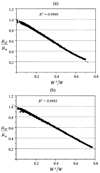Effects of enzymatic degradation on the frictional response of articular cartilage in stress relaxation
- PMID: 15863119
- PMCID: PMC2833092
- DOI: 10.1016/j.jbiomech.2004.05.045
Effects of enzymatic degradation on the frictional response of articular cartilage in stress relaxation
Abstract
It was recently shown experimentally that the friction coefficient of articular cartilage correlates with the interstitial fluid pressurization, supporting the hypothesis that interstitial water pressurization plays a fundamental role in the frictional response by supporting most of the load during the early time response. A recent study showed that enzymatic treatment with chondroitinase ABC causes a decrease in the maximum fluid load support of bovine articular cartilage in unconfined compression. The hypothesis of this study is that treatment with chondroitinase ABC will increase the friction coefficient of articular cartilage in stress relaxation. Articular cartilage samples (n = 34) harvested from the femoral condyles of five bovine knee joints (1-3 months old) were tested in unconfined compression with simultaneous continuous sliding (+/-1.5 mm at 1 mm/s) under stress relaxation. Results showed a significantly higher minimum friction coefficient in specimens treated with 0.1 micro/ml of chondroitinase ABC for 24 h (micro(min) = 0.082+/-0.024) compared to control specimens (micro(min) = 0.047+/-0.014). Treated samples also exhibited higher equilibrium friction coefficient (micro(eq) = 0.232+/-0.049) than control samples (micro(eq) = 0.184+/-0.036), which suggest that the frictional response is greatly influenced by the degree of tissue degradation. The fluid load support was predicted from theory, and the maximum value (as a percentage of the total applied load) was lower in treated specimens (77+/-12%) than in control specimens (85+/-6%). Based on earlier findings, the increase in the ratio micro(min)/micro(eq) may be attributed to the decrease in fluid load support.
Figures





Similar articles
-
Cartilage interstitial fluid load support in unconfined compression following enzymatic digestion.J Biomech Eng. 2004 Dec;126(6):779-86. doi: 10.1115/1.1824123. J Biomech Eng. 2004. PMID: 15796336 Free PMC article.
-
Frictional response of bovine articular cartilage under creep loading following proteoglycan digestion with chondroitinase ABC.J Biomech Eng. 2006 Feb;128(1):131-4. doi: 10.1115/1.2133764. J Biomech Eng. 2006. PMID: 16532626 Free PMC article.
-
Experimental verification of the role of interstitial fluid pressurization in cartilage lubrication.J Orthop Res. 2004 May;22(3):565-70. doi: 10.1016/j.orthres.2003.07.002. J Orthop Res. 2004. PMID: 15099636 Free PMC article.
-
Cartilage interstitial fluid load support in unconfined compression.J Biomech. 2003 Dec;36(12):1785-96. doi: 10.1016/s0021-9290(03)00231-8. J Biomech. 2003. PMID: 14614932 Free PMC article.
-
The role of interstitial fluid pressurization in articular cartilage lubrication.J Biomech. 2009 Jun 19;42(9):1163-76. doi: 10.1016/j.jbiomech.2009.04.040. Epub 2009 May 22. J Biomech. 2009. PMID: 19464689 Free PMC article. Review.
Cited by
-
Cationic agent contrast-enhanced computed tomography imaging of cartilage correlates with the compressive modulus and coefficient of friction.Osteoarthritis Cartilage. 2013 Jan;21(1):60-8. doi: 10.1016/j.joca.2012.09.007. Epub 2012 Oct 4. Osteoarthritis Cartilage. 2013. PMID: 23041438 Free PMC article.
-
Cartilage interstitial fluid load support in unconfined compression following enzymatic digestion.J Biomech Eng. 2004 Dec;126(6):779-86. doi: 10.1115/1.1824123. J Biomech Eng. 2004. PMID: 15796336 Free PMC article.
-
Enzymatic digestion of articular cartilage results in viscoelasticity changes that are consistent with polymer dynamics mechanisms.Biomed Eng Online. 2009 Nov 4;8:32. doi: 10.1186/1475-925X-8-32. Biomed Eng Online. 2009. PMID: 19889234 Free PMC article.
-
Attachment of cartilage wear particles to the synovium negatively impacts friction properties.J Biomech. 2021 Oct 11;127:110668. doi: 10.1016/j.jbiomech.2021.110668. Epub 2021 Aug 4. J Biomech. 2021. PMID: 34399243 Free PMC article.
-
Articular Cartilage Friction, Strain, and Viability Under Physiological to Pathological Benchtop Sliding Conditions.Cell Mol Bioeng. 2021 Apr 27;14(4):349-363. doi: 10.1007/s12195-021-00671-2. eCollection 2021 Aug. Cell Mol Bioeng. 2021. PMID: 34295444 Free PMC article.
References
-
- Ateshian GA. A theoretical formulation for boundary friction in articular cartilage. J Biomech Eng. 1997;119:81–86. - PubMed
-
- Ateshian GA, Wang H, Lai WM. The role of interstitial fluid pressurization and surface porosities on the boundary friction of articular cartilage. J Tribology. 1998;120:241–251.
-
- Basalo IM, Mauck RL, Nicoll SB, Chen FH, Ateshian GA. Interstitial fluid load support of bovine articular cartilage in unconfined compression following collagenase digestion. Proceedings of the 2003 Summer Bioengineering Conference; Key Biscayne, FL. 2003a. p. 557.
-
- Bonassar LJ, Frank EH, Murray JC, Paguio CG, Moore VL, Lark MW, Sandy JD, Wu JJ, Eyre DR, Grodzinsky AJ. Changes in cartilage composition and physical properties due to stromelysin degradation. Arthritis Rheum. 1995;38:173–183. - PubMed
Publication types
MeSH terms
Substances
Grants and funding
LinkOut - more resources
Full Text Sources

